Starting on the exciting trumpet adventure, one might wonder, \”Which kind of trumpet is best for someone just starting?\
Quality Beginner Trumpet
King 2055 Silver Flair Intermediate Bb Trumpet
CLASSIC SILVER TRUMPET
-
Overall: Medium-Large Bore For A Warm And Rich Sound -
Best Feature: Silver-Plated Finish For A Classic Look And Feel -
TedScore™: 8.5/10
Starting on the exciting trumpet adventure, one might wonder, \”Which kind of trumpet is best for someone just starting?\
Overall Beginner Trumpet
Yamaha YTR-2330
A BRIDGE BETWEEN STUDENT AND PROFESSIONAL MODEL INSTRUMENTS
-
Overall: Durable Construction Made Of Yellow Brass -
Best Feature: The Adjustable 3rd Trigger Ring Ensures A Comfortable Grip -
TedScore™: 8/10
Click for Best Price
Winner
Starting on the exciting trumpet adventure, one might wonder, \”Which kind of trumpet is best for someone just starting?\
Student
Trumpet
Bach TR300H2
Student Trumpet
RELIABLE INTERMEDIATE TRUMPET
-
Overall: Medium-Large Bore For A Warm And Rich Sound -
Best Feature: Two-piece hand-hammered Bell For Superior Tone Quality -
TedScore™: 8.5/10
Starting on the fun brass adventure, you might ask, “What Type Of Trumpet Should A Beginner Start With?”
It’s like choosing the ideal dance partner for the first dance at a local fair – thrilling but intimidating.
In my musical journey, I relied on the standard B-flat trumpet, the best choice for beginners.
It’s the go-to horn that faithfully leads you through your first notes, offering a friendly pat on the back with every successful scale.

As you read this article, you’ll discover the reasons and methods for beginning with a B-flat trumpet, ensuring you start your musical journey on the right note.
So, get ready and let the symphony of reasons serenade you into reading on– it’s a melody worth hearing again!
Table of Contents
Choosing the Right Trumpet
When I first picked up the trumpet, I was a bit lost with all the options. But don’t worry; I’ve got the scoop on how to find the perfect beginner trumpet!
Types of Trumpets
The Bb (B flat) trumpet is your best mate when starting.
It’s the A-lister of the trumpet world, favored in schools and brass bands alike for its versatile pitch and mellower sound that blends dreamily into ensembles.
Then there’s the C trumpet, known for its brighter sound and often found in the symphony orchestra.
But for beginners, sticking to Bb is like drinking tea over coffee; it’s just better to start your day!
D Trumpets and Piccolo trumpets are unique, but they’re like jumping into the deep end before you’ve had a swim lesson, so let’s shelf those for later, shall we?
Key Considerations
Pitch and design, like fish and chips, go hand in hand.
You’ll want a trumpet that sounds like what you hear in most music, which is why the Bb trumpet is the ticket.
Its newbie-friendly design lets you hit those notes without feeling like you’re wrestling an octopus.
Next, you’ve got to look at the build quality. Smooth valves, a durable build, and a bell that sings are non-negotiables for a good practice session.

Trumpet Brands
Yamaha YTR-2330
Speaking of top-notch brands, Yamaha is a trustworthy friend who never lets you down.
The Yamaha YTR-2330 beginner trumpet is stellar, easy to play, and built like a tank—well, a musical one.
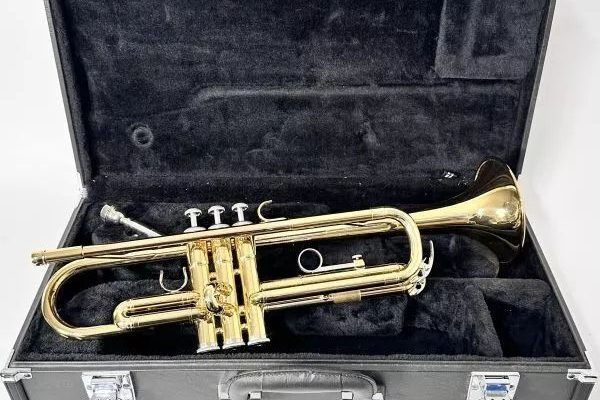
Yamaha YTR2330 Student Trumpet

A BRIDGE BETWEEN STUDENT AND PROFESSIONAL MODEL INSTRUMENTS
PERFECT FOR: Grades 1-7
FEATURES:
1. Durable construction made of yellow brass
2. The adjustable 3rd trigger
ring ensures a comfortable grip
OTHER INFO: Text
Check Price >
8/10
Yamaha YTR2330 Student Trumpet
PROS
-
Comes with a gig bag and mouthpiece -
Register and enjoy a 5-year extended warranty and 3-month Tomplay Premium
CONS
-
May be too pricey for beginner players
When you click ‘Check Price’, you’ll see there are loads of great places to buy this item. Our personal favorite is Sweetwater for the US, and Thomann and Gear4Music for the UK & Europe.
They are the largest music retailers, with excellent customer service, competitive prices, really fast shipping, and the longest guarantees.
![]()
The TedScore™: 8/10
The TedScore™ is our unique system of scoring products.
The professional musician who wrote this article combined many things,
from the product build, manufacturer’s reputation through to feedback
from other users, to create our famous TedScore™.
2
King 2055 Silver Flair Intermediate Bb Trumpet
The King 2055 is boastful of an elegant brass body and smooth valves, a perfect start for those eager lips and fingers.
It’s quite the charming companion for any novice’s musical escapades.
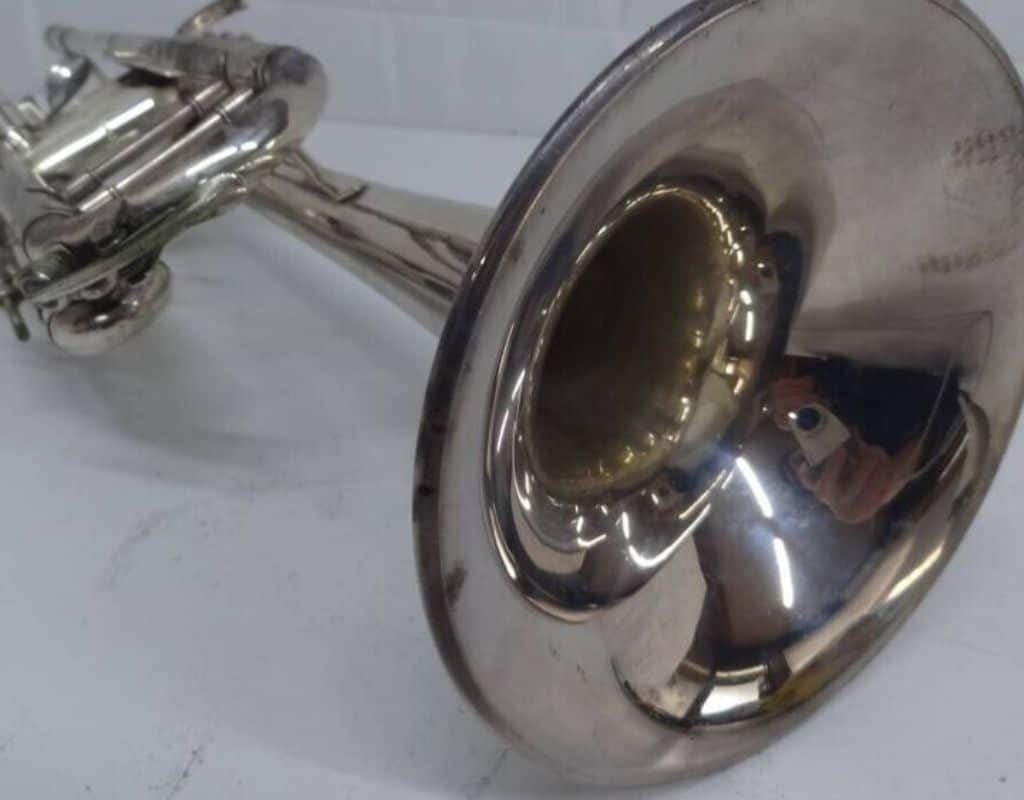
King 2055 Silver Flair Intermediate Bb Trumpet
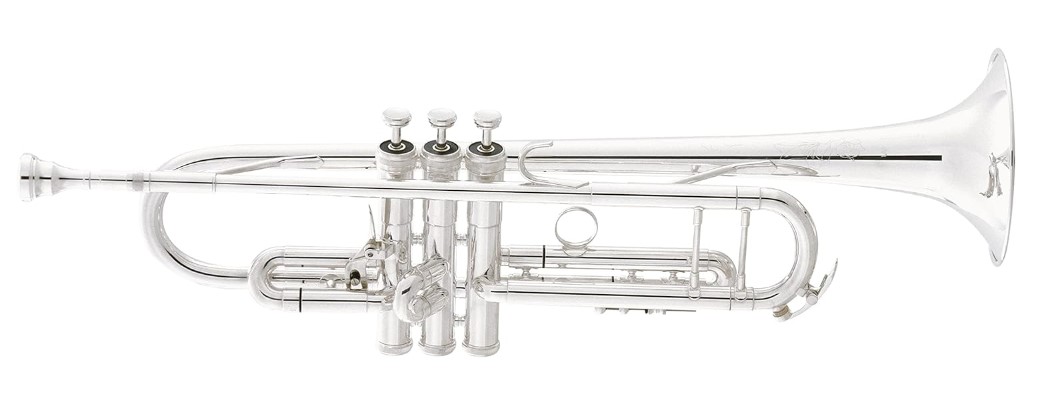
CLASSIC SILVER TRUMPET
PERFECT FOR: beginners and intermediate players
FEATURES:
– Medium-large bore for
a warm and rich sound
– Silver-plated finish for a
classic look and feel
Check Price >
8.5/10
King 2055 Silver Flair Intermediate Bb Trumpet
PROS
-
Produces a warm and rich sound with excellent tonal quality -
Classic and elegant appearance -
Affordable price point for a high-quality trumpet
CONS
-
May not have as many advanced features as some other intermediate-level trumpets -
Silver plating may require more maintenance and upkeep than other finishes
When you click ‘Check Price’, you’ll see there are loads of great places to buy this item. Our personal favorite is Sweetwater for the US, and Thomann and Gear4Music for the UK & Europe.
They are the largest music retailers, with excellent customer service, competitive prices, really fast shipping, and the longest guarantees.
![]()
The TedScore™: 8.5/10
The TedScore™ is our unique system of scoring products.
The professional musician who wrote this article combined many things,
from the product build, manufacturer’s reputation through to feedback
from other users, to create our famous TedScore™.
3
Bach TR300H2 Student Trumpet
Bach is another name you can’t ignore, and the Bach TR300 is like getting a comfy pair of trainers: reliable, supportive, and just what a beginner needs.
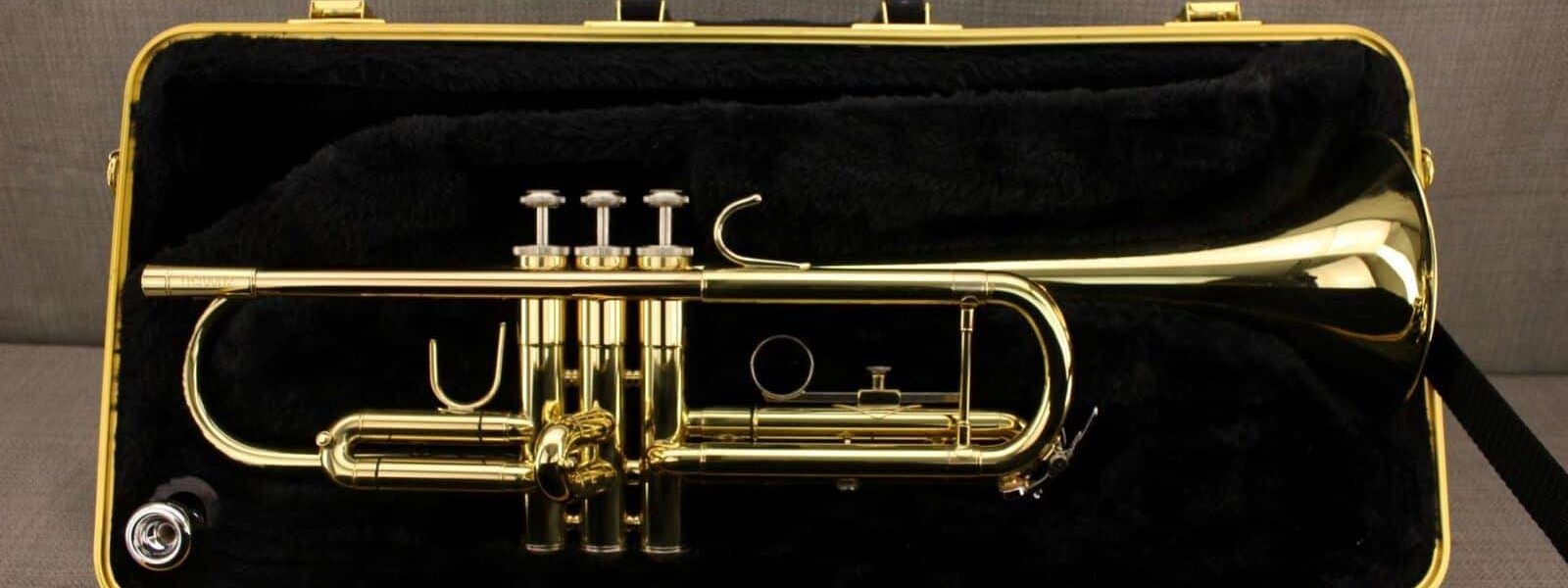
Bach Student Model TR300H2

RELIABLE INTERMEDIATE TRUMPET
PERFECT FOR: beginners to intermediate players
FEATURES:
– Medium-large bore for a
warm and rich sound
– Two-piece hand-hammered bell
for superior tone quality
– Monel alloy pistons for
smooth and responsive action
Check Price >
8.5//10
Bach Student Model TR300H2
PROS
-
Produces a warm and rich sound with excellent tonal quality -
Smooth and responsive action for precise playing -
Durable and reliable construction for consistent performance
CONS
-
May not be suitable for advanced or professional players seeking more advanced features -
Higher price point than beginner-level trumpets
When you click ‘Check Price’, you’ll see there are loads of great places to buy this item. Our personal favorite is Sweetwater for the US, and Thomann and Gear4Music for the UK & Europe.
They are the largest music retailers, with excellent customer service, competitive prices, really fast shipping, and the longest guarantees.
![]()
The TedScore™: 8.5/10
The TedScore™ is our unique system of scoring products.
The professional musician who wrote this article combined many things,
from the product build, manufacturer’s reputation through to feedback
from other users, to create our famous TedScore™.
Components of a Trumpet
Venturing into the brass family, I always find the trumpet to have a particular charm, thanks to its brilliant components.
It’s a blend of engineering and art that sounds like a dream!
Parts and Materials
We’ve got the bell, which flares out and is often a two-piece bell crafted for vibrant sound projection.
The tubing, a natural maze that loops around and leads to the bell, is typically made of yellow brass. It gives the trumpet its iconic look and balanced tone.
Professional trumpets often feature high-quality materials such as rose brass leadpipes, contributing to their warm and rich sound.
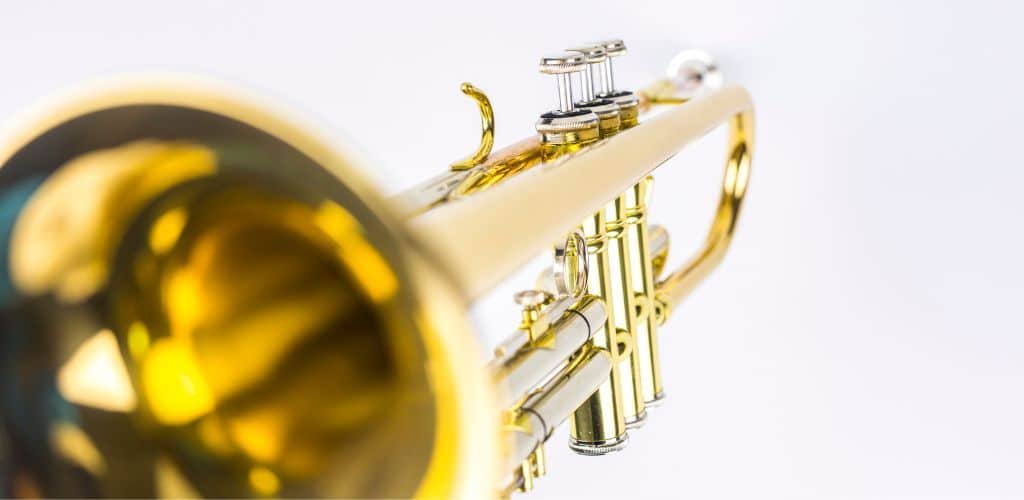
The rose brass leadpipe enhances the tonal characteristics of these brass instruments, making them popular among experienced musicians
The valve casing houses the key players—our valves! They redirect air through the tubing, allowing a symphony of pitches.
And let’s not overlook the dents; they’re not just bumps or imperfections.
Each curve and dent in the tubing is meticulously shaped to perfect the instrument’s intonation and sound color.
Mouthpiece Selection
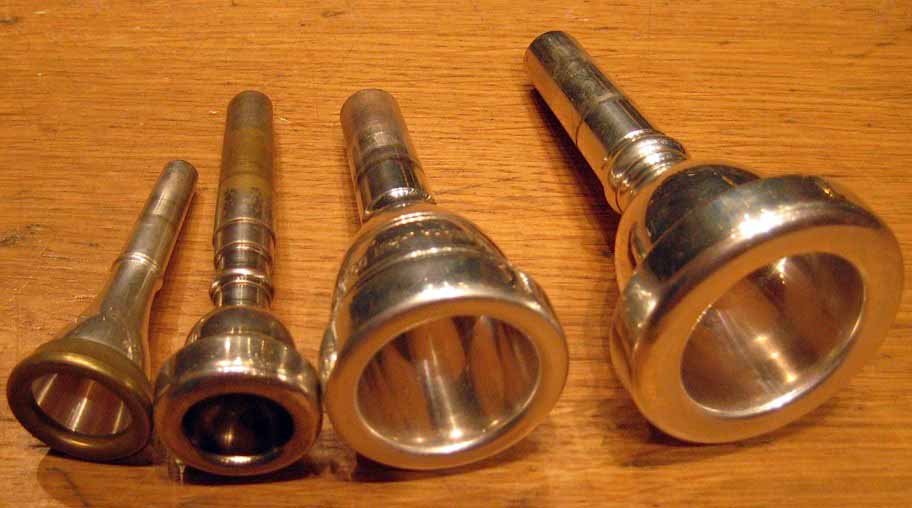
Mouthpiece, oh, what a crucial bit! It’s the first point of contact for my buzz and shapes the initial sound. Smaller mouthpieces assist control, quite the friend for beginners.
Beginners often start with a standard size; as my chops develop, I can upgrade to a bigger size for a fuller tonality.
Valve Mechanics
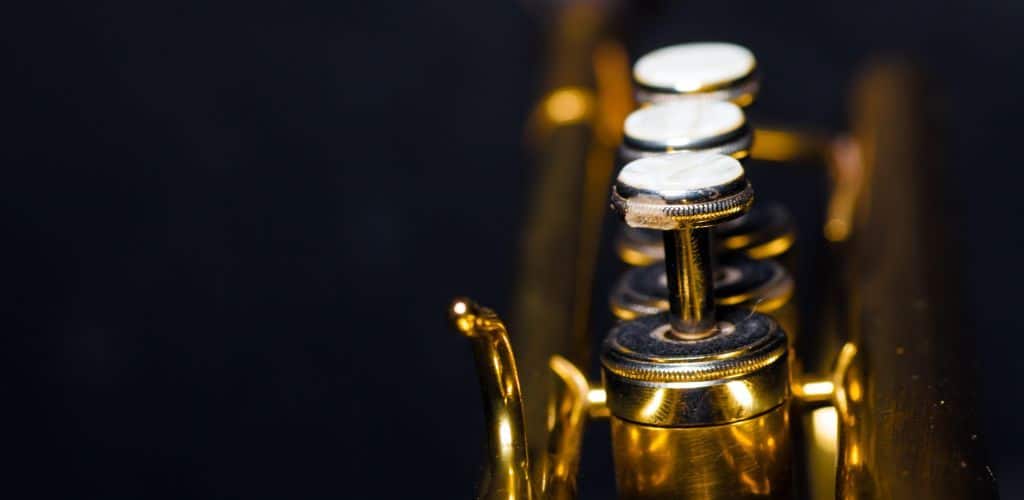
Valves, the heart of the operation, need a bit of nudge to get the air flowing where required. Pressing one down reroutes the air to different tubing lengths, which magic up different notes!
Intricately fashioned with precision, they must be in tip-top shape to keep my tunes flawless.
The water key might seem a minor detail, but it’s a lifesaver. It releases moisture that collects in the tubing because nobody likes a gurgle mid-concerto.
Think of it as a tap where the trumpet spits out its tea—as cheeky as it sounds!
Understanding Trumpet Sizes
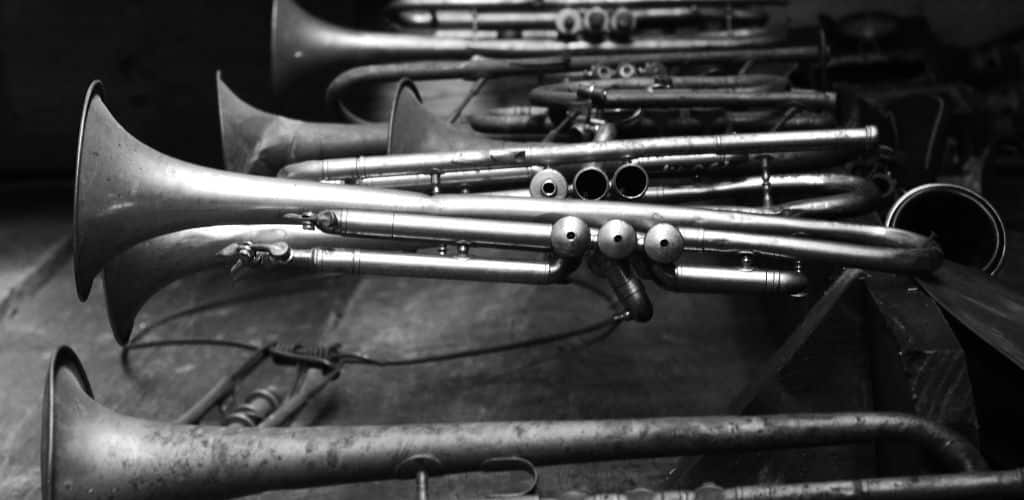
When starting on the trumpet, it’s crucial to familiarize yourself with different sizes that affect playability.
You’ll want to consider bore and bell measurements and the instrument’s weight and balance to find a perfect match for your needs.
Trumpet Bore and Bell Size
The bore size of a trumpet, which is the internal diameter of the tubing, typically ranges from about .450mm to .472mm.
As a beginner, a medium bore around .459″ to .460″ is my go-to choice because it balances resistance and ease of play. It’s forgiving, allowing me to produce a decent sound without working too hard.
Speaking of the bell size, trumpets with a smaller diameter often provide a brighter, more focused tone. This feature can be an ace when I aim for sharper sounds.
However, for an all-around sound that’s easier to control, I stick to standard bell sizes, which complement the medium bore nicely.
Weight and Balance
In my journey, the weight of a trumpet can significantly impact my playing comfort. A standard Bb trumpet weighs about 2.5 pounds, which is manageable for most beginners.
Opting for lightweight models can be a good start for younger players, as it reduces the strain on their hands and makes the learning curve less steep.
As for balance, a well-balanced trumpet feels at home in my hands, enabling relaxed touring through scales without tiring. A top-heavy trumpet can turn long practice sessions into a chore.
Beginners might find a cornet particularly friendly, with its shorter build offering easier handling and a remarkably cozy grip.
Playing Fundamentals
Before we jump into the details, it’s essential to know that the core of playing the trumpet lies in mastering the ability to produce a clear sound and understanding the instrument’s range.
Let’s unwrap these concepts and get you playing confidently.
Producing Sound

I always find it fascinating how a trumpet can sing just by me blowing air through it, don’t you?
The magic starts with your embouchure, which is how you shape your lips and mouth when you play.
To make a buzzing sound, you must purse your lips, blow air through your tightly pressed lips, and let them vibrate freely. When channeled into the trumpet, this buzzing becomes the bright, brassy sound we all love!
Pitch and sound quality hinge on how you control this buzz. The firmer your embouchure, the higher the pitch you’ll produce.
Playing around with the air pressure levels can be pretty fun, but it’s vital to nailing those clear notes.
Understanding the Trumpet’s Range
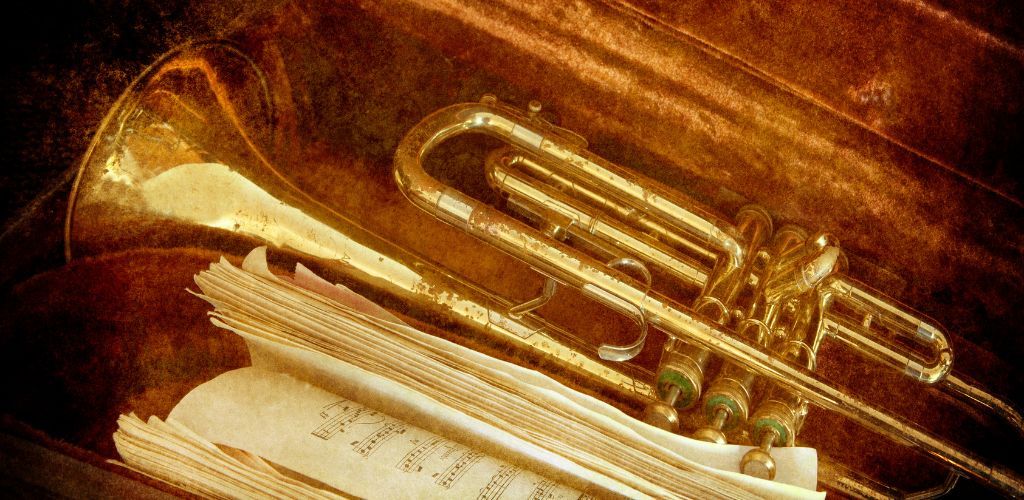
Now, about the trumpet’s range: consider it the spectrum of notes your trumpet can belt out, from the lowest to the highest.
A beginner usually starts with a Bb (B flat) trumpet because it’s the standard sweetheart in trumpeter wannabes. The Bb trumpet’s range extends over two and a half octaves, enough for me to play most tunes.
Your goal is to coax out all these notes smoothly, which, trust me, feels incredibly rewarding. It all comes down to refining your embouchure and airflow to leap gracefully from the lower to dazzling high notes.
Learning this range is like climbing a ladder – one rung at a time, steady and sure.
You can watch this video to know tips about trumpet!
Practicing Techniques
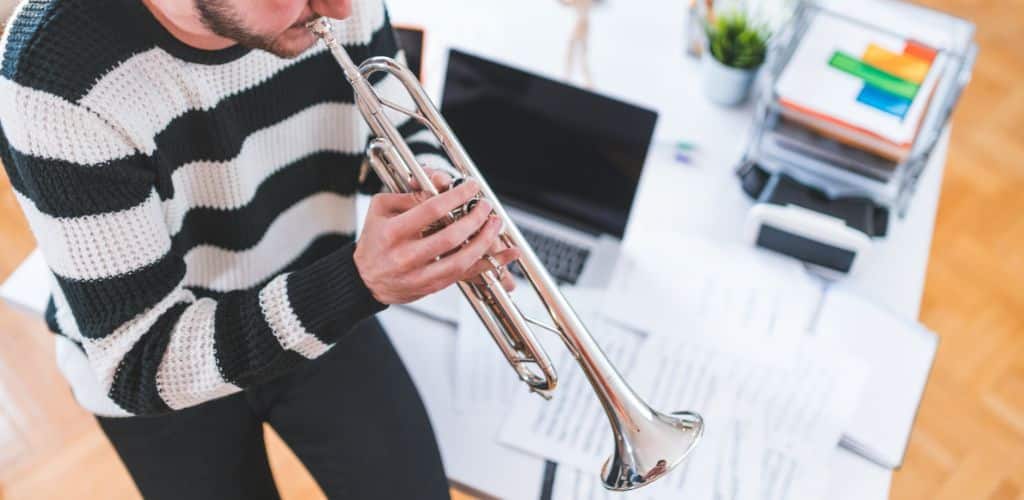
Before we toot our trumpets, let’s understand the essence of practicing techniques. It’s the golden ticket to mastering the art of trumpet playing.
Developing Embouchure
The plunge into trumpet playing starts with the embouchure, which is how I position my lips and facial muscles. It’s akin to finding the sweet spot in a comfy armchair.
I start by gently placing the mouthpiece against my lips and buzzing without overexerting. Each day is like sculpting my skills — a smidge, a tweak, and voilà, the foundation for a sterling embouchure.
https://youtu.be/4xG0l2cvqAQ?si=e3j6mGo4y56ojlwe
2
Airflow and Breathing Exercises
Next, let’s talk about the life force of trumpet playing — air. It’s not just any old huff and puff; it’s about controlled, steady blasts. I imagine my air’s journey, starting deep from my diaphragm and smoothly flowing out like ribbons in the breeze.
Practicing long tones and learning to shape phrases with my breath are my stepping stones to a breath of fresh mastery.
Daily Practice Routine
Consistency is my practice’s best friend, so I’ve set myself a daily itinerary. I’m all about bright, not lengthy, practice sessions, often ranging from 15 to 30 minutes at a pop.
Here’s the kicker: I use scales, arpeggios, and simple tunes to keep things sprightly. Over time, this potpourri of exercises is shaping my trumpet playing into a force to be reckoned with, one note at a time.
Maintenance and Care
When I first got my trumpet, I quickly learned that a well-maintained instrument is a happy partner in my musical journey. Let’s explore the essential steps to keeping our brass companions shipshape!
Regular Cleaning
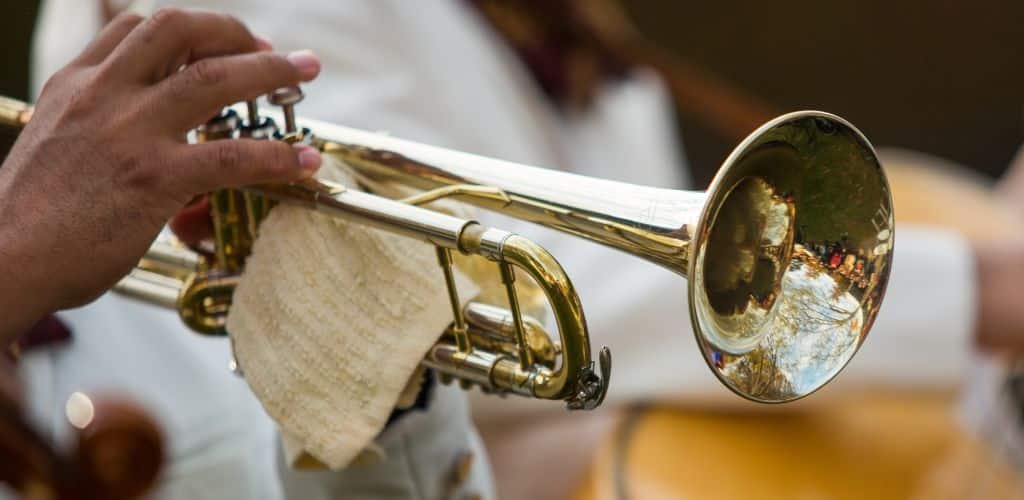
I make it a ritual to give my trumpet a proper clean at least once a week. A dash of mild soap in warm water works a treat for washing the mouthpiece and other removable parts.
Do remember to use a soft-bristled brush—it’s like a gentle spa treatment for the horn’s insides!
Next, I rinse those parts thoroughly to wash away any soapy rebellion. I let them air dry on a clean cloth, ensuring no moisture plots a comeback. This little routine keeps the trumpet crisp, like biting into a fresh apple.
Handling and Storage
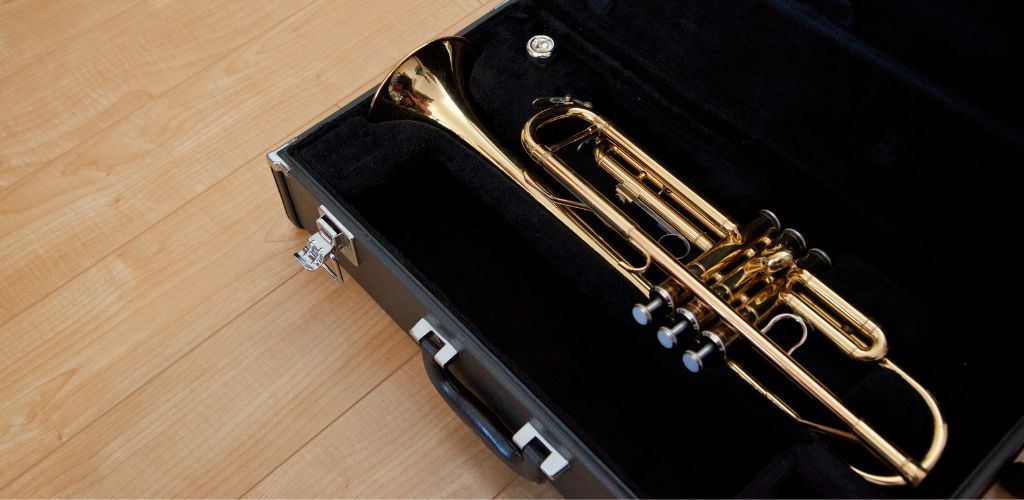
Now, handling my trumpet is like cradling a newborn kitten—with the utmost care and affection.
I always ensure my hands are clean, and if I feel particularly fancy, I might don a pair of white gloves for an extra touch of class.
It’s not just about style; it helps prevent fingerprints and tarnish, too.
As for storage, I treat my trumpet to a cozy nook in its case, cushioned and secure from the hustle and bustle of my flat.
This way, it stays snug and protected from the travails of dust and potential mishaps of daily life. A well-rested trumpet is a performer’s best friend.
Valve Oil and Maintenance Accessories
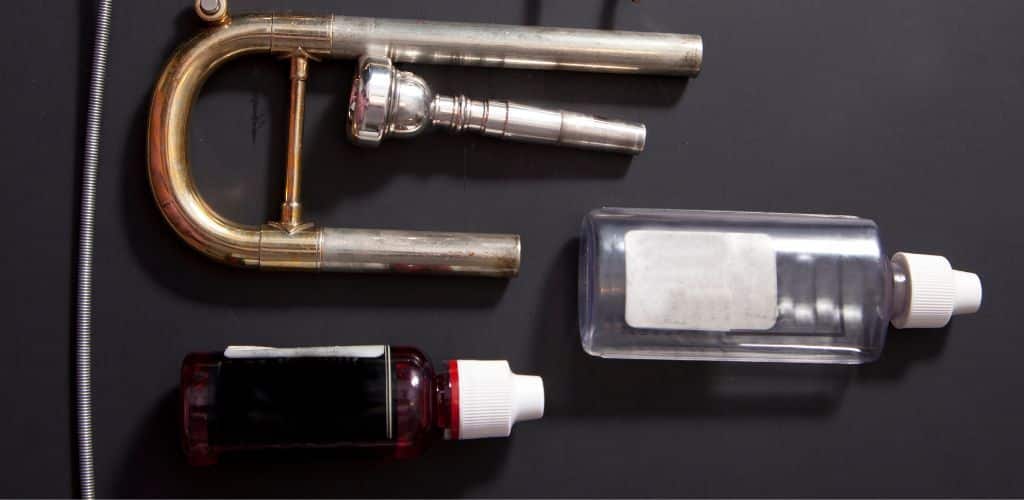
My trumpet’s valves are its beating heart, and a drop of valve oil is the elixir that keeps them pumping smoothly. I apply it regularly to keep everything moving without a hitch.
As they say, a time stitch saves nine, which certainly holds for valve maintenance!
Remember the slide grease, the secret ingredient to maintaining effortless slide maneuverability.
Having a maintenance kit with a cleaning cloth, brushes, and oils at the ready makes me feel like a trumpet whisperer. It’s like having an arsenal of care at my fingertips!
Bach 1887 Tuning Slide Grease
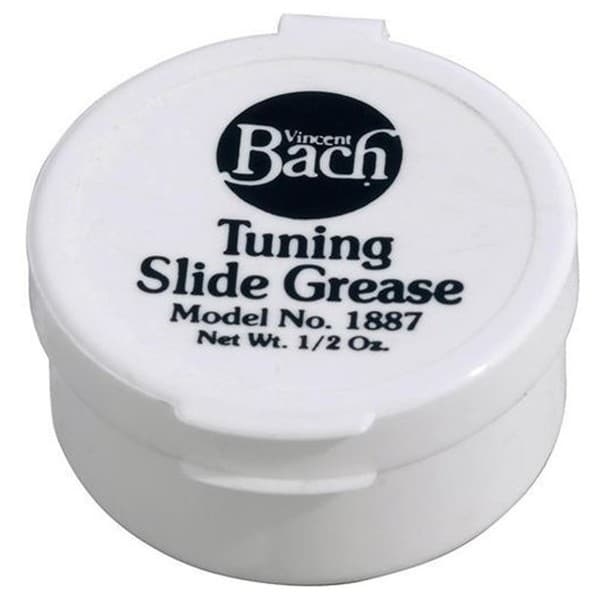
Best Trumpet Slide Grease
DESIGNED FOR: All Brass Instruments
COMES WITH: Compact package for easy portability
FEATURES: High-quality and long lasting,
Highly concentrated for instant results
Check Price >
9/10
Bach 1887 Tuning Slide Grease
PROS
-
Creates air-tight seal on slides -
Regular thickness suits all slides -
Odourless, non-toxic and long-lasting
CONS
-
None!
When you check the price above, you’ll see there are loads of great places to buy this item. Our personal favorite is Gear4music.
It is the largest music retailer in the UK and fast becoming the most respected online music shop in the US too. Their customer service is excellent, they have competitive prices, really fast shipping, and usually have the longest guarantee.
Most professional musicians use Gear4music, so there is no reason why you shouldn’t too!
The TedScore™: 9/10
The TedScore™ is our unique system of scoring products.
The professional musician who wrote this article combined many things,
from the product build, manufacturer’s reputation through to feedback
from other users, to create our famous TedScore™.
Additional Accessories
When I started playing the trumpet, I quickly realized that a few choice accessories made a difference.
They not only protect your instrument but also enhance the experience and quality of play—let me share my must-haves.
Essential Beginner Accessories
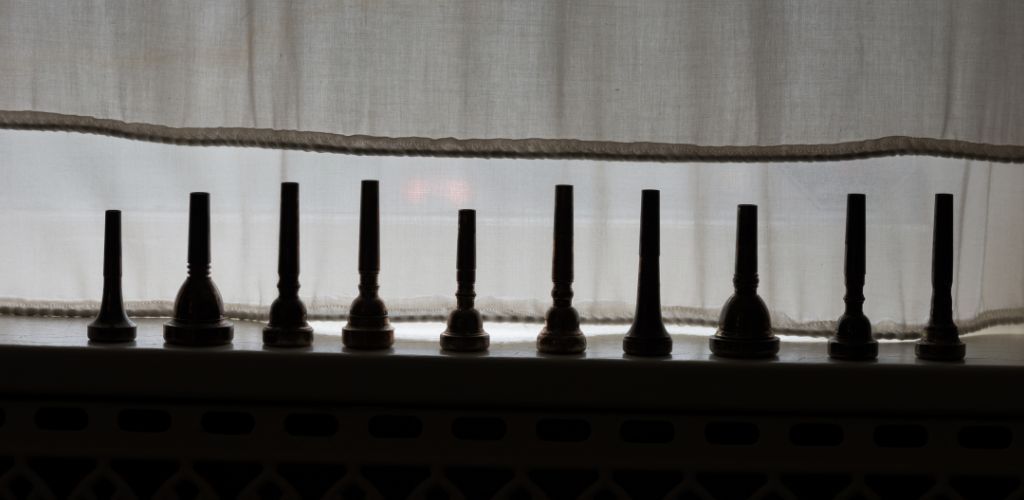
Some items are non-negotiable for any budding trumpeter. A 7C mouthpiece, for starters, is ideal; it’s almost a rite of passage and just perfect for building up those embouchure muscles.
You’ll also need valve oil to keep your trumpet’s valves running smoothly, essential for avoiding sticky situations during practice.
Remember a cleaning cloth—it’s your trumpet’s best mate for wiping away fingerprints and grime after a session.
A tuner or metronome is invaluable for keeping you in time and in tune—as we all know, there’s a fine line between a breathtaking performance and a cacophony!
Steiner Trumpet Valve Oil

Best For All types of valves
DESIGNED FOR: High-greade instrument oil
FEATURES: Developed to provide good lubricity and high film strength
Check Price >
9/10
Steiner Trumpet Valve Oil
PROS
-
Resistance to emulsion formation -
Made for 3 different types of applications: regular, classic, and ultra-light
CONS
-
None!
When you check the price above, you’ll see there are loads of great places to buy this item. Our personal favorite is Gear4music.
It is the largest music retailer in the UK and fast becoming the most respected online music shop in the US too. Their customer service is excellent, they have competitive prices, really fast shipping, and usually have the longest guarantee.
Most professional musicians use Gear4music, so there is no reason why you shouldn’t too!
The TedScore™: 9/10
The TedScore™ is our unique system of scoring products.
The professional musician who wrote this article combined many things,
from the product build, manufacturer’s reputation through to feedback
from other users, to create our famous TedScore™.
Enhancing Your Trumpet
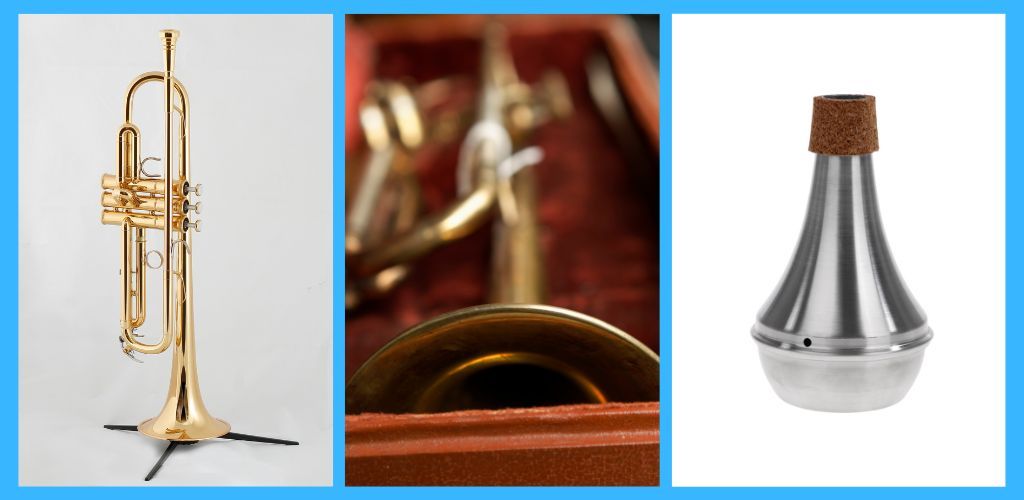
Let’s jazz things up a little, shall we?
A mute can add a whole spectrum of tones to your play, giving you those cool, whispery jazz sounds or the practice-room-friendly muted volume.
Sheet music is the bread and butter of our world, so a sturdy music stand to display your pieces is a must.
A solid case of cradling your trumpet is the best transport method without knocks or dings. Some cases also have room for all those little extras to keep everything together.
Trust me, that’s an absolute convenience for any trumpeter on the go!
Budgeting for Beginners

Before diving into the options available, let me stress the importance of balancing cost with quality.
Beginners deserve an instrument that provides both affordability and reliable performance to kick-start their musical journey.
Cost-Effective Choices
As a beginner, the sheer number of trumpets on the market overwhelmed me, but my budget helped narrow the options. Student trumpets generally range from under £150 to over £750.
Trumpets below £150 might be tempting, but they often have cheaper construction, affecting durability and playability.
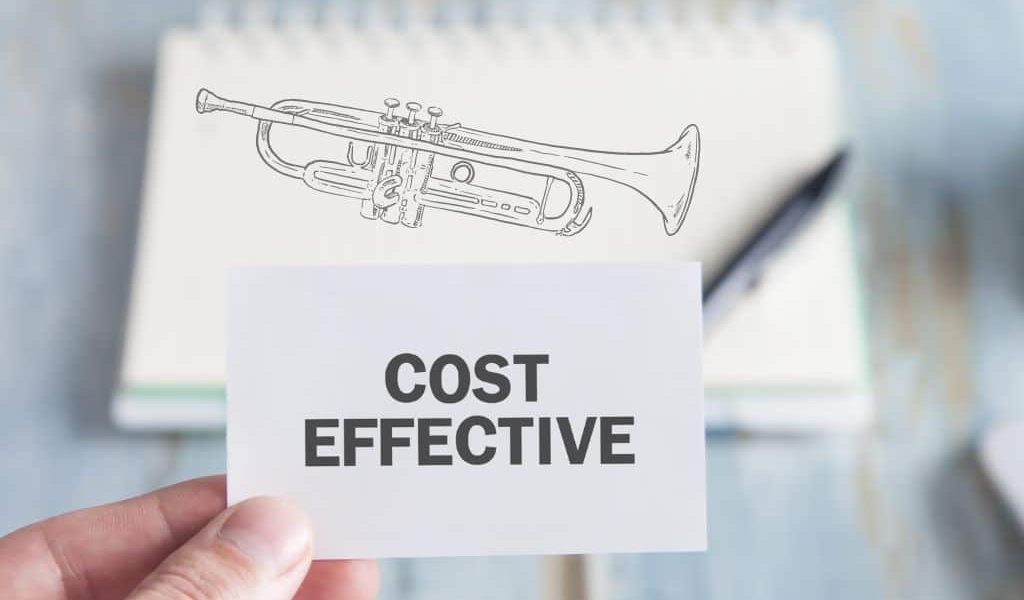
When I started, my sweet spot for a budget was between £150 and £375, which allowed me to buy a solid beginner’s instrument without breaking the bank.
Renting a trumpet is worth considering, especially if you’re testing the waters of your musical interest.
Rentals can cost as little as £15 to £30 monthly, and usually, you can apply some of that cost towards purchasing a trumpet if you decide to stick with it.
This is a fabulous option because it minimizes upfront investment while providing value.
The Value of Investing in Quality
I’ve always believed investing more at the start can be cost-effective in the long term.
Higher quality trumpets within the beginner’s range, closer to the top end of your budget, often have better build quality and sound.
These instruments tend to last longer and may prevent the need for costly repairs, giving you great value for your money.
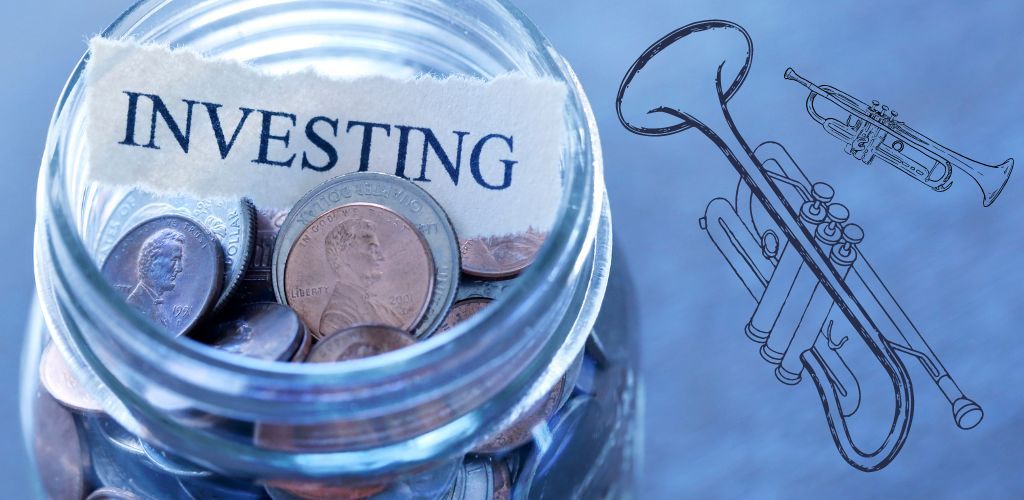
However, don’t assume that the most expensive option is the best for a student. A well-made trumpet that sits comfortably in the middle of your budget can often be the most suitable choice for beginners.
Quality in this context refers to a trumpet that stays in tune, has smooth valve action, and produces a clear sound; it doesn’t necessarily equate to the priciest tag.
Remember, it’s about finding the best value, not just the lowest or highest price.
Upgrading Skills
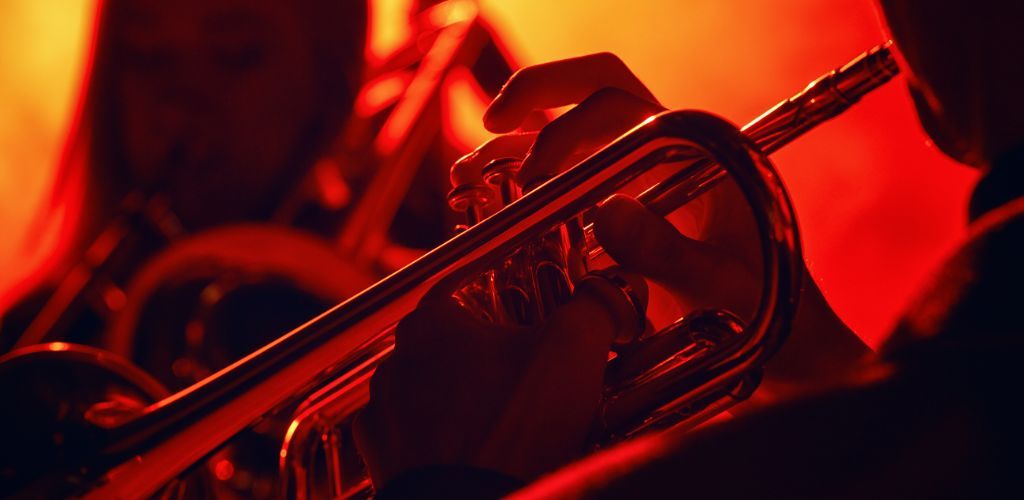
Young trumpet students often begin their musical journey with a standard brass instrument before progressing to more specialized ones like the piccolo trumpet.
With its smaller size and higher pitch, the piccolo trumpet offers a unique learning experience for aspiring musicians.
As students advance, they may also explore other instruments, such as string instruments, to broaden their musical skills and understanding.
Transitioning from standard brass instruments to the piccolo trumpet and eventually to other musical disciplines can provide a well-rounded musical education for young students.
Seeking Professional Advice
It’s wise to seek guidance from the pros. Tapping into their expertise is a game-changer for your musical journey.
Lessons and Guided Learning
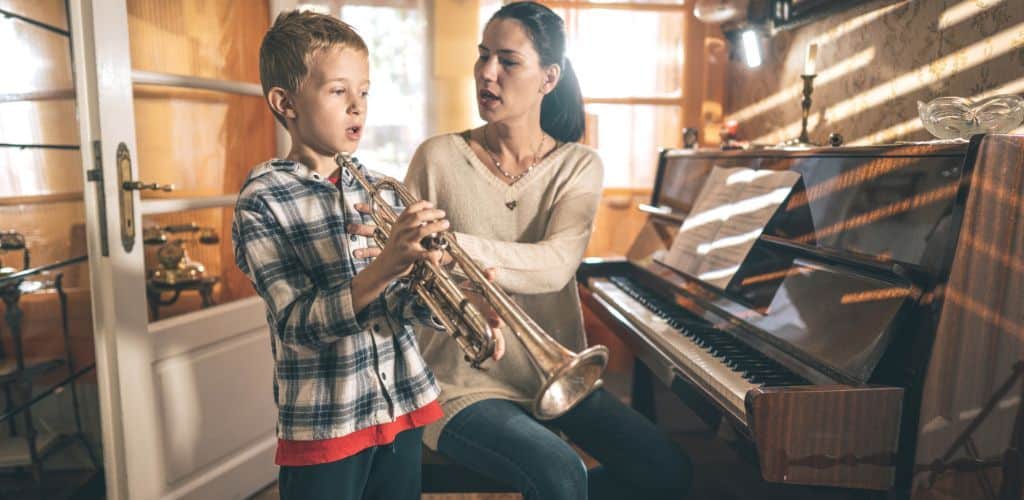
I can’t stress enough how valuable it is to sign up for trumpet lessons at your local music shop. They’re brimming with teachers who’ve mastered tooting that horn.
This is about more than just learning the notes. It’s about embracing a whole new musical vocabulary with a touch of class!
Having a teacher by your side is like having a personal trumpet guru. They’ll spot and fix your tiny blunders before they turn into giant habits. Yep, those cheeky mistakes won’t know what’s hit them!
Online Resources and Community

Have you ever stumbled across an online trumpet community?
Let me tell you, it’s like finding a second family! The beauty of the internet means tips and tricks are just a click away. Imagine having an entire orchestra’s knowledge at your fingertips—it’s pretty nifty.
Dive into forums, watch how-to videos, and even participate in webinars. Each plays its part in shaping your sound to be uniquely yours.
And let’s remember those digital pats on the back from fellow enthusiasts who’ve walked the path you’re treading.
Exploring Different Music Genres
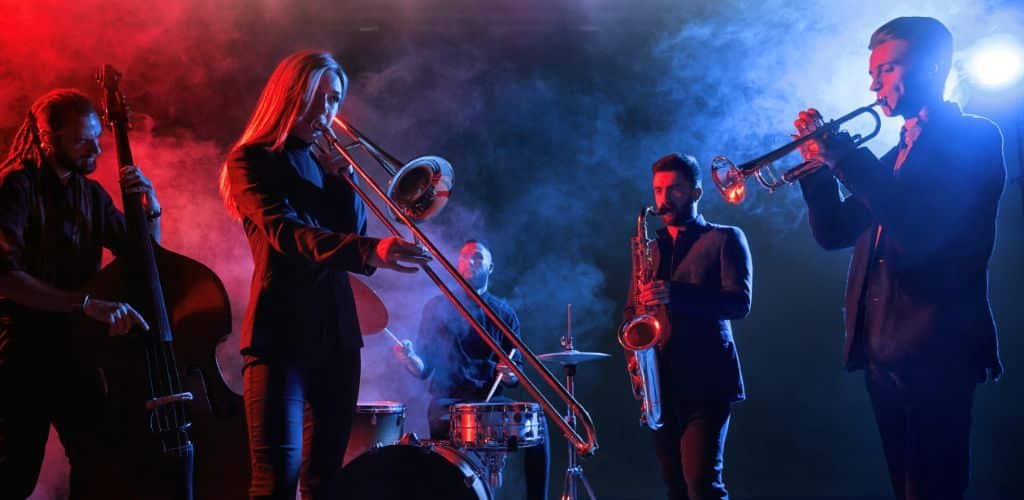
Choosing the right trumpet to dive into the marvelous music world depends greatly on the genre that tickles your fancy.
Let’s waltz through classical and jazz to see what suits you best.
Classical and Orchestras
https://youtu.be/14j3l7KjYJw?si=IOlPZs7vKvI3vNFY
I’ve always found the classical genre grand and nuanced, something that resonates within the halls of orchestras. The B-flat trumpet is your go-to if you aim to play in an orchestra.
It’s a staple for composers like Mozart and a favorite among many for its versatile sound. You’ll see the B-flat trumpet cradled in the hands of classical musicians, navigating the intricacies of symphonic masterpieces.
Jazz and Solo Play
https://youtu.be/TI5T05jq5UU?si=L0Usk4XBhtV3V13p
Ah, jazz! It’s all about expression and the personal touch you bring to music. Greats like Louis Armstrong and Miles Davis became legends with their unmistakable sounds.
For jazz and solo performances, you can experiment with different types of trumpets later on.
However, starting out, a B-flat trumpet allows you to learn the ropes while still allowing you to groove to that jazzy beat.
What Type of Trumpet Should
a Beginner Start With?
The Roundup
When I first delved into the world of trumpeting, I quickly learned that the Bb trumpet is the go-to beginner’s choice. It’s the mainstay in orchestras and bands, making finding resources and sheet music a breeze.
Plenty of eager beginners brighten up when they can quickly grasp this instrument. The joy of producing those crisp, pure notes on a Bb trumpet is second to none! My pocket felt light; starter models are affordable.
And here’s a fun morsel to chew on: C trumpets are a viable alternative for beginners, especially if you’re mingling with orchestral groups. It’s like having a backstage pass to symphonic circles right away.
However, stick to the Bb trumpet for easier melody matching and a smoother learning curve.
Get your trumpet in the correct key and start making beautiful music. Imagine the wonderful songs you’ll create.
Enjoy the process and keep in mind that practice is essential. Have fun playing the trumpet!
Wait! There’s more…
Explore the best trumpet practice mutes available and find the perfect one to enhance your practice sessions. This comprehensive article reviews the best trumpet practice mutes to help you make an informed decision.
FAQ’s
What trumpet should a beginner start with?
A beginner should start with a standard B-flat trumpet, a popular choice for those new to the instrument. The B-flat trumpet is versatile and commonly used in various musical genres, making it an excellent option for beginners.
How do I choose my first trumpet?
When choosing your first trumpet, consider factors such as your budget, the instrument’s build quality, and the manufacturer’s reputation. Look for best beginner trumpets that are easy to play and produces a clear sound, and consider seeking advice from experienced musicians or music teachers to help guide your decision. Additionally, testing different trumpets to find one that feels comfortable and suits your playing style can be beneficial in selecting the right instrument for your musical journey.
How much is a good starter trumpet?
A good starter trumpet can range in price, but generally, you can find quality beginner trumpets between $300 and $800. When evaluating the value of a starter trumpet, it’s important to consider factors such as build quality, playability, and included accessories. Seeking guidance from experienced musicians or music educators can help you find a suitable instrument within your budget.
What trumpet is easiest to play?
The trumpet often considered most straightforward for beginners is the B-flat trumpet. Its design and standard tuning make it popular for those learning the instrument. Some beginner-friendly trumpet models may feature ergonomic design elements and playability enhancements to make learning more accessible for new players.
Why is the trumpet popular for beginners?
The trumpet is famous for beginners due to its relatively straightforward design, standard tuning, and versatility across various music genres. Its compact size and accessible fingering make it easier for beginners to handle and learn. The trumpet’s prominent role in school bands and beginner music education programs contributes to its popularity among new players.
Are Silver Trumpets Better Than Brass?
Both silver and brass trumpets are popular choices and offer their unique characteristics. The material used in the trumpet construction, whether silver-plated or brass, can affect the instrument’s appearance, feel, and sound. Silver-plated trumpets may have a brighter and more focused sound, while brass trumpets can produce a warmer and mellow tone. Ultimately, the choice between silver and brass trumpets comes down to personal preference and the specific sound qualities that a player desires.
Is it hard to play Trumpet?
Playing the trumpet can be challenging, requiring developing embouchure (mouth and lip) strength, breath control, and finger dexterity. However, with regular practice, proper instruction, and dedication, many people can progress significantly and enjoy trumpet playing. Like any musical instrument, learning to play the trumpet effectively takes time, patience, and consistent effort.









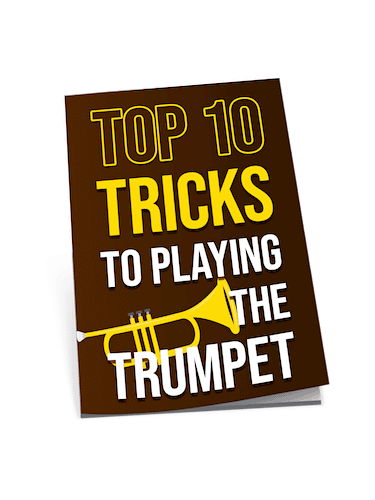

if i could get a trumpet that plays itself i’d be in the band tomorrow just imagine, winning at COD and playing the trumpet at the same time would be epic
While all the info here is solid, Toby, I think there’s a point to be made about trumpet bore and bell sizes not being the only factors in sound. Material and craftsmanship play huge roles too. Been playing for over 30 years and seen a student model outplay an intermediate simply because it was better cared for.
Playing trumpet in jazz band was the best choice i ever made. It’s all about that unique sound!
Totally agree, there’s nothing quite like it!
Hey Toby Coles, I’m just starting out in my school’s band and was wondering if the Yamaha YTR-2330 would be a good choice for a total beginner like me? I’ve read it’s pretty user-friendly but would love your take on it!